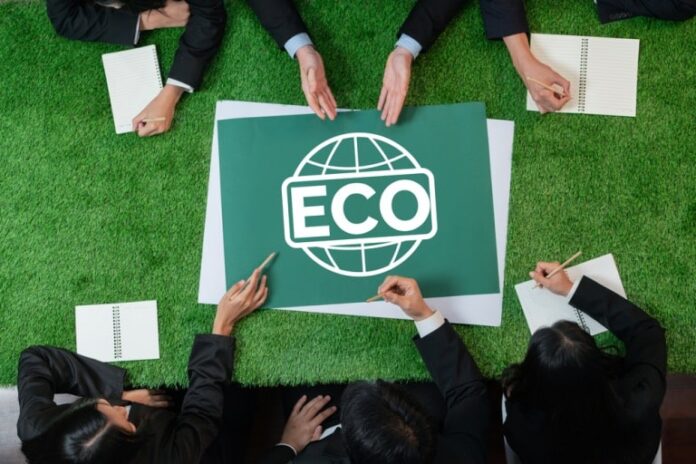Eco-friendly business is more than a trend — it’s a strategic advantage for forward-thinking businesses. Forward-thinking companies prioritizing sustainability are better positioned to align with evolving consumer expectations, navigate regulatory landscapes, and drive long-term profitability.
Sustainable initiatives reduce environmental impact and boost brand credibility and long-term profitability.
The Power of Eco-Friendly Business
Sustainability is now a key differentiator in an often saturated marketplace. Many consumers favor companies that demonstrate environmental responsibility, influencing purchasing decisions and brand loyalty.
This trend has led businesses to rethink their approaches, integrating sustainability into branding and corporate social responsibility initiatives. Businesses highlighting their commitment to sustainability can cultivate stronger customer loyalty and differentiate themselves in an increasingly eco-aware market.
Stakeholders, including investors and partners, also prioritize eco-consciousness. They recognize that sustainable practices can mitigate risks and drive financial performance.
Many investors now assess a company’s environmental, social, and governance (ESG) criteria before making financial decisions. Businesses that implement sustainable initiatives appeal to investors and enhance their long-term stability and resilience against regulatory and market shifts.
This shift underscores the necessity for businesses to embed sustainability into their core operations to remain relevant and competitive. Companies that overlook sustainability may fall behind competitors undertaking green initiatives. Integrating eco-friendly practices allows businesses to stand out while advancing sustainability efforts.
Integrating Sustainable Solutions into Operations
Sustainable solutions integrated into business operations create environmental and economic advantages. Transitioning to renewable energy sources like solar panels reduces greenhouse gas emissions and lowers energy costs over time. Additionally, adopting energy-efficient technologies and practices enhances operational efficiency and lowers utility expenses.
Businesses investing in commercial solar design can significantly cut energy expenses while reinforcing their commitment to sustainability. Doing so relies upon building your own infrastructure — usually through rooftop panels. Some businesses prefer investing in utility-scale solar design, relying on dedicated solar plants and farms.
Eco-Friendly Products and Packaging
Reducing waste through eco-friendly products and packaging is a tangible way businesses can lessen their environmental impact.
Innovations in Product Design
Companies like Patagonia have successfully minimized their environmental footprint by innovating product designs that prioritize sustainability. From using recycled fabrics to developing closed-loop production systems, brands that incorporate eco-conscious design elements create long-term value for both consumers and the planet. These innovations demonstrate that businesses can merge profitability with environmental responsibility.
Differentiation Through Eco-Friendly Practices
Sustainable initiatives strengthen companies’ market position while contributing to environmental conservation. Businesses that actively promote their commitment to sustainability attract a loyal customer base that prioritizes ethical consumption.
Communicating sustainability efforts through transparent marketing and corporate initiatives strengthens brand trust and customer engagement.
The Long-Term Benefits of Going Green
Adopting eco-friendly practices offers numerous long-term advantages. Enhancing brand reputation through sustainability initiatives fosters customer loyalty and attracts a growing segment of eco-aware consumers.
Businesses that integrate sustainability into their branding and corporate mission often experience increased customer engagement and retention, as consumers prefer to support companies that align with their values.
Energy efficiency, waste reduction, and potential tax incentives can lead to substantial savings. Solar, wind, and other renewable energy sources reduce utility expenses in the long run. Moreover, waste minimization strategies, like reducing packaging or repurposing materials, reduce costs while also benefiting the environment.
Staying ahead of environmental regulations ensures businesses can proactively adapt to policy changes and avoid potential fines. Many governments are introducing stricter environmental laws, and companies anticipating and adapting to these changes can maintain operational continuity without incurring penalties.
Assuming a leadership role in sustainability enables businesses to gain a competitive edge, stay ahead of regulatory changes, and attract environmentally conscious stakeholders.
Taking Action: Implementing Sustainable Strategies for Growth
Sustainable practices are key to long-term business success and environmental impact. Reducing energy use, minimizing waste, and adopting renewables enhance efficiency and lower costs. Strengthening brand reputation and attracting eco-conscious consumers ensures resilience against evolving regulations and market trends.
Small, strategic sustainability efforts generate lasting benefits. A steadfast commitment to broader eco-friendly goals ensures businesses remain adaptable and resilient in an increasingly sustainability-focused market.
